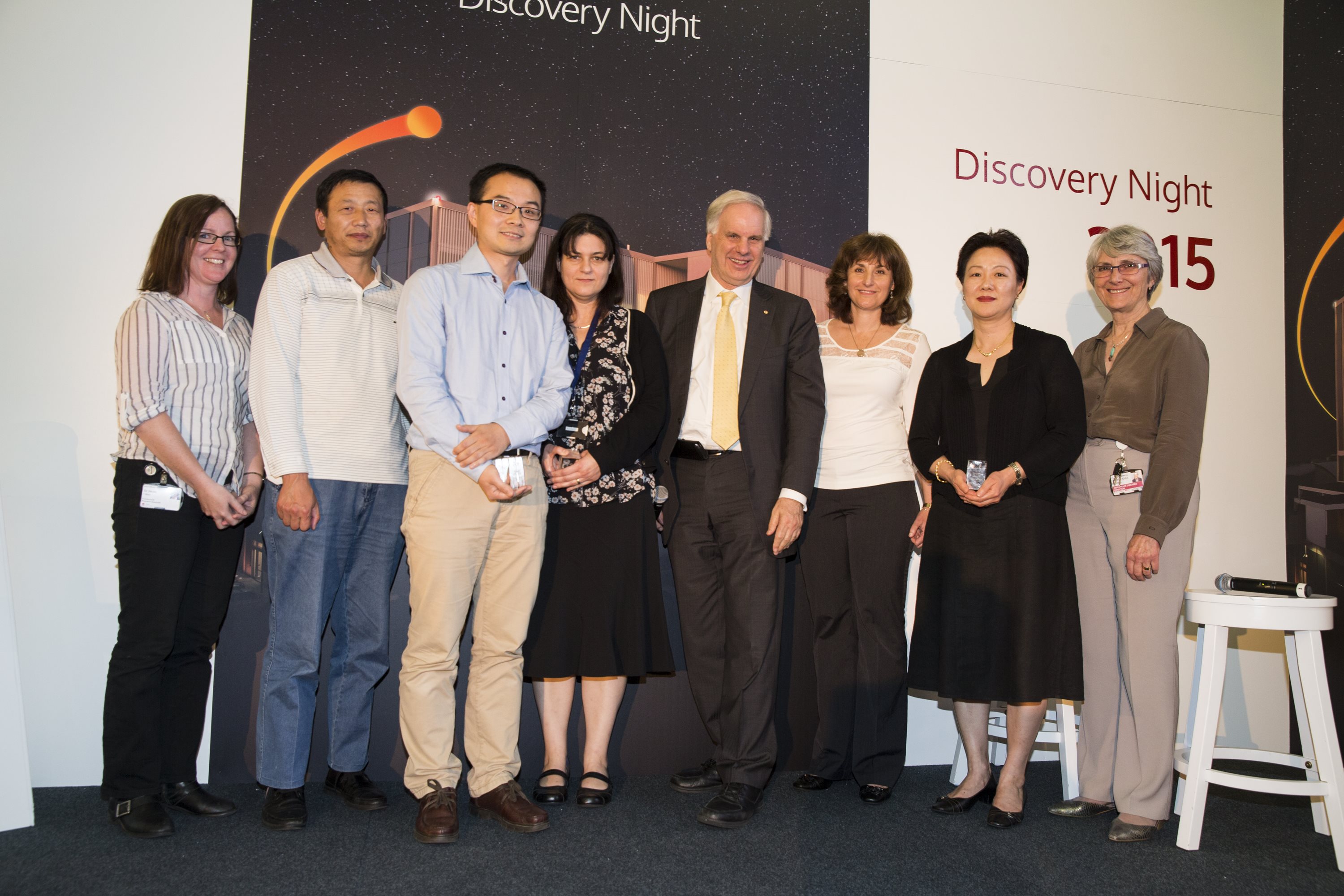December 9, 2015 Print
The Westmead Institute for Medical Research has announced the winners of its annual Science Prizes – awarded to those who have published the most significant research findings of the past year.
 Institute ED Professor Tony Cunningham (Centre) with Science Prize winners (from left to right) Dr Heidi Hilton, Dr Yiping Wang, Dr Qi Cao, Dr Sophie Lev, Associate Professor Julianne Djordjevic, Dr Min Kim, and Professor Tania Sorrell (accepting for Professor Wieland Meyer)
Institute ED Professor Tony Cunningham (Centre) with Science Prize winners (from left to right) Dr Heidi Hilton, Dr Yiping Wang, Dr Qi Cao, Dr Sophie Lev, Associate Professor Julianne Djordjevic, Dr Min Kim, and Professor Tania Sorrell (accepting for Professor Wieland Meyer)
Open to more than 200 post-doctoral researchers at the Institute, seven Institute scientists investigating diverse medical problems including the herpes simplex virus, fungal pathogens Cryptococcus gattii and Cryptococcus neoformans, chronic kidney disease, and breast cancer received the prestigious award for 2015.
Dr Min Kim from The Westmead Institute’s Centre for Virus Research won a Science Prize for her significant research into understanding how the immune system reacts to the herpes simplex virus (HSV).
HSV is a highly prevalent virus that causes cold sores and genital herpes and also increases the chance of contracting HIV.
“Once HSV infects the human body through broken skin, it stays in our body throughout life. It is important to understand the initial immune reaction involved in this process so we can target the cells and come up with a protective vaccine,” Dr Kim said.
Her research, published in the journal Plos Pathogens, made significant inroads into understanding how the virus is relayed through skin cells, and provides a guide for vaccinating against HSV.
“Our research found that certain immune cells were targeted by HSV, and that those cells relay the viral antigen to other cells. Based on our findings, we concluded that intradermal vaccines would be better than intramuscular vaccines.”
Science Prize winner and researcher from The Westmead Institute’s Centre for Infectious Diseases and Microbiology, Professor Wieland Meyer was awarded for his groundbreaking paper – published in mBio – which used whole genome sequencing to investigate the emerging human pathogen, Cryptococcus gattii.
Cryptococcosis infection is acquired by inhaling fungal spores affecting the lungs first and can quickly spread to the brain and other organs, with often fatal consequences. Together with C. neoformans, this human pathogen causes more than 1 million deaths each year with ongoing outbreaks identified on Vancouver Island and in the US Pacific North-West.
“This study established the global population structure of this specific molecular type, discovered the origin of the ongoing outbreak – Brazil, and established Australia as a stepping stone in the global spread of the infection,” Professor Meyer said.
“Importantly, by closely analysing the genomes of more than one hundred globally isolated C. gattii strains, we identified numerous genes potentially related to habitat adaptation, virulence expression and clinical presentation.
“We found that C. Gattii has several genes which make outbreak strains more capable of surviving colder environments, and genes that make lung infections caused by the fungus more deadly.”
Associate Professor Julianne Djordjevic and Dr Sophia Lev, also from The Westmead Institute’s Centre for Infectious Diseases, won their Science Prize for research into the AIDS-related fungal pathogen, Cryptococcus neoformans, which causes a million cases of infection every year and 600 000 deaths.
“We investigated how phosphate, a nutrient essential for cryptococcal growth, is taken up by the pathogen and whether phosphate acquisition strategies are required for fungal virulence,” Associate Professor Djordjevic said.
“This is the first study highlighting the contribution of phosphate acquisition to virulence in a medically-relevant fungus.
“If we can understand ways to block the uptake of phosphorous by the fungus, then we can potentially apply this to antifungal drugs in future development.”
Identifying and defining the role of phagocyte cells involved in chronic kidney disease was the aim of a research published in the Journal of American Society of Nephrology by Science prize winners Dr Yiping Wang and Dr Qi Cao from The Westmead Institute’s Centre for Transplant and Renal Research.
“Chronic kidney disease is a major and serious health problem in Australia. Our study found particular subsets of cells that can cause kidney damage and inflammation, which is the reason for the progress of this disease,” Dr Wang said.
“It is a very exciting discovery which has great potential to translate into clinical benefits for patients through future development of specific drugs designed to target these cells.”
Understanding how hormones work in the normal human breast and how this might be linked to breast cancer was the focus of research published in the journal Oncotarget by Science Prize winner Dr Heidi Hilton from The Westmead Institute’s Centre for Cancer Research.
“For a long time it has been believed that estrogen receptors (ER) and progesterone receptors (PR) are always co-expressed together in the same cell,” Dr Hilton said.
“We’ve shown that this is actually not true. Our research has demonstrated that ER and PR are quite distinct in the normal human breast but that their action and expression converge in breast cancer.
“It is a mind reset for our understanding of how hormones work in the normal human breast. Unless we understand accurately or completely how hormones work in the normal human breast, we are not going to understand breast cancer.”